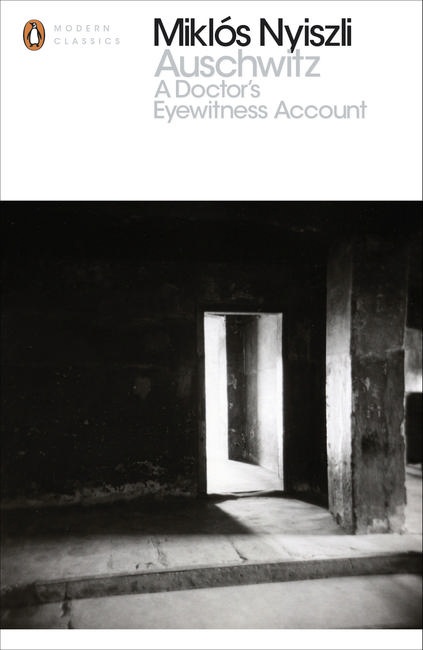Miklós Nyiszli survived Auschwitz by volunteering as a doctor. He vowed if he survived he would write down his experiences so the whole world would know what the Nazis did in the death camps. In 1947 this memoir was published in Hungarian. It was translated into English in 1960.
Miklós Nyiszli, a Jewish doctor born in Austria-Hungary, was transported to Auschwitz concentration camp along with his wife and teenage daughter in June 1944. On the notorious ramp where prisoners were divided off to the left (certain death) or the right (prolonged life, but a high probability of death as well), Nyiszli volunteered that he was skilled as a doctor.
The Nazis, despite their madness, had use for the highly qualified. He was separated from his wife and daughter, and soon found himself working under the notorious Doctor Josef Mengele. Mengele was your typical Nazi crackpot racist whose ‘scientific’ work was centred around attempts to find out how twins were created genetically. If he could crack that code, then German women could populate like crazy, grinding out twins.
Nyiszli in his civilian life was trained in autopsy and often used his skills to discover how victims of violent crime met their end. Working under Mengele he found himself performing autopsies in an effort to support the Nazi’s pseudo-scientific race theories. He often confesses to coming close to madness when performing this ghastly work.
For example, one day Mengele returned cheerfully to the autopsy room after inspecting a new arrival of Jewish prisoners to announce he’d found a man with a hunchback. The man had a son with a deformed foot. Mengele believed he had found evidence of Jewish genetic deformity, proof that the Jews were an inferior race. In one of the many awful scenes in the book, Nyiszli interviewed the man and his son, who had just come off the deporting train and little realised what was to be their fate. It was at this moment that Nyiszli had to steel his nerves, for he knew Megele would order their murder and demand he perform an autopsy on them. Sure enough, father and son were taken outside and then shot in the back of the head. Once Nyiszli had performed the autopsy, Mengele wanted the bodies reduced to skeletons and sent to an eminent German museum. Nyiszli had to perform this grisly task as well.
Other shocking ironies abound. When the Jewish prisoners tasked with clearing up bodies from the gas chambers found a young girl with signs of life at the bottom of a pile of corpses, Nyiszli was brought in. He gave her a few injections and managed to revive her. But once she had been ‘saved’, what to do with her? Of course it was just a matter of time before the incident was reported and the girl killed. Nyiszli was always finding himself in this terrible position, and no wonder that he often feared he would go mad.
The whole time Nyiszli was in Auschwitz he vowed if he ever got the chance he would write down his experiences so the whole world would know what happened in the death camps. Unlike other Holocaust memoirs (If This is a Man by Primo Levi and Man’s Search for Meaning by Viktor E. Frankl), this account is a more clinical and direct one. These memoirs weren’t written to be treated as literature, but as a faithful document. Nyiszli’s prose is neat and clean. In the manner and style he writes, it’s quite obvious that he is anxious to catch exact detail. Never have I read something that so urgently sets its task as faithful communication.
By some extraordinary luck, Nyiszli managed to be reunited with both his wife and daughter after he was liberated from Auschwitz. There was a close call, however. He once built up the courage to ask Mengele if he could search for his wife. He was given a day pass and found them in a women’s camp. He next learnt that, under Mengele’s orders, the camp was to be ‘liquidated’. By bribing an SS guard with cigarettes he was able to get them sent off to a labour camp. Miraculously, they both survived.
This is such a moving and shocking book that words simply can’t do it justice. It’s surreal and unbelievable that people can be so ruthlessly murderous, killing people in an industrial operation, and the whole time thinking they were indisputably superior beings.
Auschwitz: A Doctor's Eyewitness Account, by Miklós Nyiszli. Published by Penguin Classics. ISBN: 9780141392219 RRP: $19.99

No comments:
Post a Comment